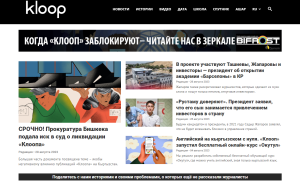Prosecutors in Kyrgyzstan have reportedly filed a claim seeking to suspend the work of Kloop, a well-respected independent Kyrgyz media outlet best known internationally for its collaboration with the Organized Crime and Corruption Reporting Project (OCCRP).
Kloop reported that it received notice on August 28 that the Prosecutor’s Office in Bishkek had applied to city courts for the liquidation of the organization on the grounds that its activities “exceed the scope provided for by its charter.”
The bulk of the claim, however, focuses on the tone of Kloop’s coverage of the government, underscoring increased pressure on media in Kyrgyzstan.
Kloop.kg is a Kyrgyz news website, launched in June 2007, whose contributors are largely students and graduates of the Kloop Media Public Foundation School of Journalism. Kloop Media Foundation is registered as a public foundation for developing journalism and fostering political awareness among youth.
The prosecutor’s claim states that the organization’s charter does not include “dissemination of information” and therefore it should be shut down for operating outside the boundaries of its registration. Kloop notes, however, that its charter does state its mission as “providing young people and other representatives of civil society with an information platform for free expression of their opinions on socio-political and economic processes.”
Kloop’s lawyer, Fatima Yakupbayeva, told OCCRP, “For online media, there’s no requirement to register as mass media, which means there is no violation of the law.”
The claim, which Kloop published in full, devotes the most attention to complaints about the tone of Kloop’s journalism based on an audit performed by the State Committee for National Security. Among the complaints are that Kloop “published materials are aimed at sharply criticizing the policies of the current government” and that “most of the publications are purely negative, aimed at discrediting representatives of state and municipal bodies.”
Kloop’s reports, the claim alleged, “contain hidden manipulations of the opinion of the society, which are imposed with negative processes that do not correspond to reality and create opposition to any undertakings of the current government.”
The government’s unnamed “psychiatric experts” apparently took umbrage at a report titled “Migrants Save the South of Kyrgyzstan” which Kloop says it never published. (A Google search of the alleged article title turns up a 24.kg news report from 2014 sharing statistics on migrant labor remittances contributing to a decrease in poverty in Kyrgyzstan’s south.)
Kloop noted a series of other “interesting pearls” in the claim, including the dual allegations that Kloop both publishes statements “containing propaganda of the inferiority of citizens of the Kyrgyz Republic in comparison with the Russian nation” but also publishes “statements that are hostile and humiliating in relation to citizens of Russian nationality.”
The claim goes on to allege that Kloop’s reporting “directly has a negative emotional and psychological impact on society, thereby generating emotions of fear, anxiety, despair, panic among a huge mass of people, constantly feeling the instability and uncertainty of their social position, losing confidence in their strength and hopes for the future.”
Furthermore, “the false or discrediting information about the activities of state bodies, replicated by Kloop, causes the population of the country to distrust the government and contributes to the growth of political instability, weakening and loosening of the constitutional order.”
This isn’t the first time a Kyrgyz government has lashed out at bad news. Back in 2018, an MP from the Bir Bol party, Akylbek Japarov (no relation to current President Sadyr Japarov), proposed a ban on bad news in Russian. Kloop at the time published a piece of incisive satire: “In Kyrgyzstan, everything is good (Material specifically for deputy Japarov.)”
Akylbek Japarov is now chairman of the Kyrgyz Cabinet of Ministers, and the bad news keeps coming.
Kloop is one of Kyrgyzstan’s best media outlets, producing quality content both in Russian and Kyrgyz. It works with international partners, like OCCRP and RFE/RL, to publish hugely important reports on corruption in Kyrgyzstan, such as the late 2019 bombshell report on Raimbek Matraimov’s corrupt enterprise and a report (published the same day the claim was filed) about Kamchybek Tashiev’s family’s involvement in the construction of the Barcelona Football School in Kyrgyzstan.
Tashiev heads the SCNS, conveniently the organization that performed the inspection of Kloop yielding such absurd complaints. And the coincidences don’t end there.
Reports about Tashiev and his family’s involvement in various business operations in Kyrgyzstan have an odd habit of immediately proceeding trouble for the media that publish them. Look no further than the case of Bolot Temirov, whose YouTube channel, TemirLive, published a series of reports on Tashiev’s family’s business dealings in 2022. After each report, pressure on Temirov intensified. Temirov was eventually stripped of his Kyrgyz citizenship and deported to Russia.
In an interview with state media, President Japarov complained: “From the beginning, you have taken an approach to bring harm to the Kyrgyz people… This can’t continue. I have a request for you: if you can’t work for the benefit of Kyrgyzstan, at least do no harm.”
The recent claim against Kloop comes in the wake of receding pressure on RFE/RL, which spent much of the last year fighting Bishkek’s efforts to shut down its operations. Kyrgyzstan has long had Central Asia’s most dynamic civil society, including some of the region’s best independent media outlets and journalists. The media sector has come under increased pressure in the last few years, with a 2021 “fake news” law undergirding the campaign against RFE/RL.
Anna Kapushenko, the editor-in-chief of the Russian-language version of Kloop.kg, told RFE/RL that if the claim is not withdrawn, Kloop will countersue.
“The statement alleges that our publications undermine state authority. We will thoroughly investigate each accusation brought forward by the prosecutor’s office, scrutinizing the validity of the allegations and the methodology employed in the analysis,” Kapushenko pledged.
In the meantime, she said, “We will continue our online operations and sustain our work.”
She noted that Kloop has long anticipated the possibility of its website being blocked, and has prepared a “mirror” website.
































